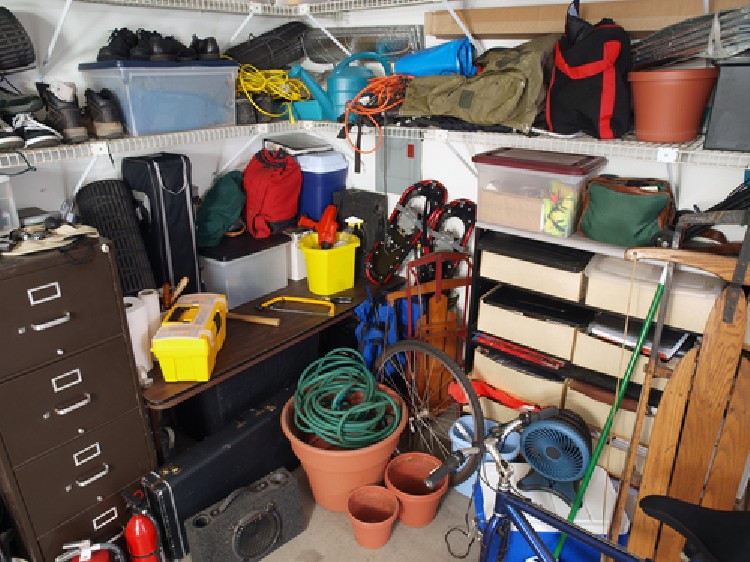In a corner of Sarah’s living room, a decades-old phonograph sits ignored. Sarah doesn’t use it anymore, doesn’t even know if it still works. Only the housekeeper pays any attention to it, or to the dozens of records stacked nearby, and that’s only to dust them. Sarah also has books, hundreds of books, in almost every room of her Princeton, NJ, home.
But she can’t part with any of it.
“Why am I keeping them? If I get rid of the records, that would free up four shelves that I could use for more current activities. But even though it’s a real nuisance in the present, they represent a positive memory; they’re symbolic of the past,” said Sarah, 73, who asked that her last name be withheld to preserve her privacy. “How do people give up the things that are symbolic, that have no present usefulness? I think it’s harder, the older we get, to get rid of the past.”
But our stuff, as we age, can be far more than a nuisance, some experts say. It can be downright dangerous, acting as an anchor that keeps some older people from making needed changes, whether that entails downsizing or moving, either in with relatives or into facilities better equipped to meet their health, mobility or care needs.
“We call it ‘material convoy,’” said sociologist David J. Ekerdt, PhD, a leading gerontologist. “People are accompanied through life by a convoy of materials they acquire during different stages of life. When people have children, they acquire all sorts of equipment for the raising of children. When they buy a house, they acquire more stuff to furnish it. Certain jobs might require equipment or clothing. And they acquire stuff to develop interests or hobbies, such as gourmet cooking or gardening.
It takes a lot of courage to get rid of things that were once central to your identity.
“Before long, we have houses that are very, very full of things, thousands and thousands of things,” he added.
The result, Ekerdt and other experts say, is that many people approach their later years feeling trapped by their trappings.
This concept has so intrigued Ekerdt that the University of Kansas researcher is midway through a major study—funded by the National Institute on Aging—examining “stuff.”
“A majority of people would say that they own too many things, and dealing with those things makes them reluctant to think about moving,” even when moving is in their best interest, he said, generalizing the results of a telephone survey his research team conducted of 300 people age 50 and older.
Ekerdt and his research partners—Wayne State University in Detroit and the University of Missouri—have studied the stuff, and the stuff’s owners, in more than 100 households in Kansas City and Detroit.
Finding It Hard to Let Go
While Ekerdt has found that most people he has studied are relieved after ridding themselves of their possessions, the idea of shedding stuff can heighten an older adult’s anxieties about aging.
“For some people, letting go (of possessions) is like an admittance of infirmity and the inevitability of passing,” said Julie Hall, author of The Boomer Burden: Dealing with Your Parents’ Lifetime Accumulation of Stuff (2008). She is a North Carolina-based estate liquidator who calls herself “The Estate Lady.” “One of my clients said to me, ‘This means I’m one step closer to the coffin.'”
Further, it’s just easier to stash, rather than trash.
“The convenience of storage outweighs the inconvenience of disposal,” Ekerdt said. “Nowadays, if you have anything other than two bags of trash, you have to make special arrangements (with the sanitation department). It’s just easier to throw stuff in a cabinet or drawer.”
Downsizing also forces people to scrutinize themselves, and introspection isn’t easy.
“The bottom line is, it’s very hard to do it (decide what to dispose of), because it is an encounter with yourself,” Ekerdt said. “You have to face who you’re going to be. You have to get rid of things that were once intrinsic to your identity. You have to face a future in which you are not the you you once were. It takes a lot of courage.”
Cleaning out Can Be Cleansing
Yet later life tends to demand downsizing, Ekerdt and Hall agree. Some people in their 50s and beyond face the task of “household disbandment” for myriad reasons, such as health or financial problems, the loss of a spouse to death or divorce, or concerns about security. Others move because they can’t maintain their property anymore or want a home with better, or more age-appropriate, amenities.
Stuff can be especially stifling for adults in their 70s and up. That’s because they are the generation that grew up during the Depression or shortly thereafter, when frugality was a family value ingrained out of necessity.
“We now live in a very disposable culture. But that particular generation tends to have a keep-it-in-case mind-set. They accumulate things in case the hard times return,” Hall said.
Brenda Decker is a social worker for geriatric psychiatric patients in suburban Seattle. She has seen how stuff can strangle, both with her patients and with her mother, 69. Decker moved her mother into a nursing home and later a group home after growing concerned that her stuff had become a dangerous hazard. Her mother was a hoarder, surrounding herself with so many belongings that navigating her house required near-acrobatic skill. It took Decker months to sort through her mother’s stuff, which included years of receipts for all of her purchases.
Experts agree that hoarding, unlike simple clutter, is a mental disorder in which someone compulsively saves and stashes stuff far beyond what a person would reasonably need.
“Possessions can become a security blanket, especially as a person gets older and loses loved ones; their stuff is something to focus on if they feel lonely or depressed,” said Decker, who asked to use a pseudonym to protect her mother’s and her patients’ privacy.
When you give things away, knowing that someone else will benefit can ease the pain. Taking photos of what you’re surrendering can help too.
Still, not everyone has problems parting with possessions.
Judy Miller of suburban Philadelphia was eager to spare her adult children the headaches she knew, through experience, a household cleanout can cause.
Miller, 65, has been through it twice, cleaning out her parents’ coastal New Jersey home and her in-laws’ suburban Philadelphia home when illness and infirmity led all four to move in with relatives or into nursing homes. Her parents, thrifty to a fault, had so many well-worn possessions—and oddities, such as two full garbage bags of meticulously cleaned margarine and ice-cream tubs—that Miller chucked almost everything.
“We filled up three Dumpsters,” she said. “When I was going through the whole thing, I thought, ‘Oh my god, I’m going home to clean out my own house. I never want my kids to have to go through that.’”
Downsizing Is a Family Affair
Those reluctant to resort to Dumpsters have other options that might make downsizing easier, experts say. Hall recommends passing on possessions that are valuable or sentimental to relatives or close friends, while surrendering the rest to charities or giving them away through nonprofits such as Freecycle. Knowing that someone else will benefit from your stuff can ease the pain of its absence. Getting rid of possessions at a yard sale or on such sites as Craigslist or eBay can also help underscore the worth of your things, she added. Taking photographs of items that you are willing to surrender can help preserve memories too.
Experts agree that downsizing works best when it is a family affair. Relatives can help shoulder the onerous physical burden of trashing, donating, bequeathing, storing or selling, while also offering opinions or comfort when an older adult grapples with the difficult, often emotional decisions about each item’s fate, Ekerdt said.
Hall urges adult children to have a “courageous conversation” with their aging parents and to encourage them to downsize while they remain independent and able enough to lead the effort.
Relatives should assist, rather than assert, when sorting stuff, Ekerdt suggested.
“Family is family, and they do what they do,” he said. “Household disbandment is an opportunity for them to enact their typical family roles. If they’re congenial, supportive, have a good laugh and share hugs at Thanksgiving dinner, you can expect that’s how they’ll be in this process.”
But when stuff-stashing evolves into hoarding that verges on hazardous, Decker said to forget about treading carefully. Hoarding is a mental illness—a hoarder’s loved ones must make the home safe, she said, even if it means conducting a covert cleanout to dodge the drama that disposal might engender.
Sarah is not a hoarder—she knows that, eventually, some stuff will have to go. She’s just in no rush.
“We both say we’re going to go out of this house feet first, and we don’t want to leave a mess for our son,” Sarah said of herself and her husband. “I notice that we have more stuff than we use. And awareness is the first step to action.”
 Dana DiFilippo has been a reporter for 21 years, writing on everything from storm-water runoff to gritty homicides. She has earned many state and regional awards for her stories. Dana lives in New Jersey with her husband, a photographer, and their two children.
Dana DiFilippo has been a reporter for 21 years, writing on everything from storm-water runoff to gritty homicides. She has earned many state and regional awards for her stories. Dana lives in New Jersey with her husband, a photographer, and their two children.



